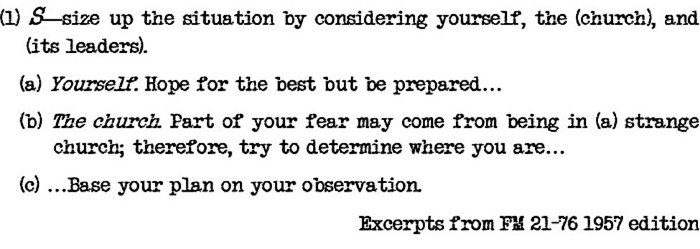Size Up the Situation

SURVIVAL Series

Today’s conservative Evangelical pastors and church leaders are privileged to have the best and most schooling for Bible knowledge than any other time in history. Most pastors will earn a Master of Divinity, while others continue to pursue a doctorate’s degree. What is the purpose of these educational accomplishments? Many of them like the idea and the luxuries of being a professional pastor. A doctorate will pave the way to better marketability, notoriety, ministry opportunities, higher pay, and benefits at a more affluent and larger church. It also affords them popularity, prestige, and speaking engagements.
We, as Christians, are to be cautious and “Size Up” our church leadership. We are commanded to be wise as serpents (Matthew 10:16). “Beloved, do not believe every spirit, but test the spirits to see whether they are from God” (1 John 4:1). Second Corinthians 11:13-15 warns us that some men will be “false apostles, deceitful workmen, disguising themselves as apostles of Christ.”
Many men who will fill future pulpits have never been scripturally tested before entering seminary, nor will they afterward. They were never laymen long enough to earn the right to become elders or deacons in their own churches because they were too young, being in their twenties, and lacking experience. But when they earn their seminary degree at the “old and mature experienced age” of twenty-five, the church will automatically recognize them to be ready for leadership.
With their church’s blessing, young men will take it upon themselves to go into financial debt to buy their right to become a pastor-elder. If they are lucky enough, someone may pay for them. Their schooling will cost them thousands of dollars and countless hours of reading and studying. Once they’ve earned their degrees, the church community will then count them qualified to be a pastor/elder. His biblical qualifications will never be doubted!
Here is an example of an actual large church on the East Coast. Look at the list of degrees and social status of this conservative church:
Pastor
- Duke graduate
- MDiv. from Gordon-Conwell Theological Seminary
- Master’s from The Southern Baptist Theological Seminary
- Doctorate’s in Ecclesiastical History from Cambridge University
Elders – Besides having occupations such as business owner, and a controller for the National Headquarters, they possessed coveted degrees at the following schools:
- Texas A&M
- George Washington University
- MDiv and Ph.D. degrees from The Southern Baptist Theological Seminary
- Engineering at Princeton University
Deacons
- Just a mention of their names and a brief bio
- No Harvard or Yale graduates here
- No Ph.D.’s, only high school graduates, or a mention of an anonymous college
I’m not saying that the men above with the accomplished stats are not godly leaders. I don’t know them, nor have I attended this church. But note that what you will not find in this church’s leadership are men without education or job prominence. This is not unlike many other churches in America. Unfortunately, it has become the norm. The above is an example of a Christian Dream Team for leadership. Many of today’s pastors and congregants seem to aspire for it because it sounds great and gives their church legitimacy. The credentials inventory is also an important marketing strategy when listing their church leader’s education, social status, and prominence in the community. However, nothing is ever mentioned about their biblical qualifications according to Titus 1: 5-9; 1 Tim. 3:1-10 and 1 Pet. 5:1-4!
Because of today’s church’s educational demands, the twelve disciples would never be considered for pastoral or elder roles! The only area that the “twelve” might be qualified for would be as deacons. In all the years that I have been attending church, I’ve never seen men with advanced education levels or high job status as deacons. The only biblical difference between the deacons and pastors/elders is, a deacon is not required to teach.
Yet with all this education and 2000 years of the Church’s existence, the church still struggles with its form and function. The Christian body is still trying to figure out how to lead a church, even though there have been countless seminars and volumes of books on the topic. Yet, many churches continue to create paths not directed by Scripture, especially when it comes to leader selection.
Today’s practice is to hire the most seminary-educated man available, put prominent men in leadership, and assume they are biblically qualified and know what they are doing.
The problem is not the lack of knowledge of the Bible; it is that the church has substituted biblical qualification for a seminary degree. Here is where several issues in the modern church begin. One is hiring men solely based on their education. Secondly, the church is being led by certain men who were never fit for the ministry in the first place. These men went from kindergarten to seminary, never displaying or practicing an elder’s abilities, aptitude, skill, experience, characteristics, or requirements!
The church should never complain that the unsaved world calls them hypocrites. At its very core, today’s church practices hypocrisy when choosing its leaders solely based on their education. The church will give the biblical requirements lip service, but in reality, they make them optional.
As laymen, we are to “Size Up” these men (1 Tim. 3:10). Paul wrote to the Ephesian church about choosing deacons; they were first to test their men’s biblical qualifications to be considered for deacon service. They were to test and prove their godly character. “Deacons likewise must be dignified, not double-tongued, not addicted to much wine, not greedy for dishonest gain. They must hold the mystery of the faith with a clear conscience. And let them also be tested first; then let them serve as deacons if they prove themselves blameless.” (1 Timothy 3:8–10).
If a church is to test and prove their deacons before they can serve, how much more are they to wait and test a man’s character to be their pastor or elder?! Instead, when choosing a pastor, his educational degree will always replace the church’s testing phase. When a church shops for a pastor from the “outside,” one who has never set foot in the hiring church, that churches leadership and congregation do not even know if he is saved, biblically qualified for the ministry, is like-minded in doctrine, or a wolf in sheep’s clothing. Their evaluation of him is merely based on whether he has the right schooling, a lovely family, and appears to be a friendly and caring person. Whether he wears a suit and tie or Hawaiian shirts and khakis… (fill in your dress code here), he’s hired!
Before a man is considered for church leadership, he should already have been demonstrating the following biblical characteristics in his home church:
- A desire for the position. By the Holy Spirit, the Lord stirs up an insatiable love for his church and correct doctrine to be lived out (1 Tim 3:1).
- His church is testing him to see if he meets the biblical requirements of the position (Titus 1: 5-9; 1Tim. 3:1-7 & 1 Pet. 5:1-4)
- Feeding and shepherding his church (1 Peter 5:1-2).
- Effectively teaching and preaching the whole counsel of God’s Word (2Tim 4:2).
- Effectively demonstrating how “to observe all things” (Matt. 28:20), teaching the church to observe all that Christ has commanded us.
- He is demonstrating that he can protect the church from error (Titus 1:9-13).
- Able to teach older men “to be sober-minded, dignified, self-controlled, sound in faith, in love, and in steadfastness” (Titus 2:1-2).
- Able to teach older women “to be reverent in behavior, not slanderers or slaves to much wine. They are to teach what is good, and so train the young women to love their husbands and children, to be self-controlled, pure, working at home, kind, and submissive to their own husbands, that the word of God may not be reviled” (Titus 2:3-5).
- His desire should be approved, provided he is qualified for the office (Matthew Henry Commentary).
He must be known as a man who can say, “imitate my life” to his church as Paul said in 1 Cor 4:15-17; 1 Cor 11:1; Phil 3:17; Phil 4:9; 2 Thess 3:7-9; and 2 Tim 3:10-11. He is a man that genuinely loves everyone in his congregation. A man who may not naturally be a “people person” can work at it and become one. He does not show favoritism but looks forward to sharing his life with everyone in the church. Unfortunately, there are far too many poor examples of church leaders who only hang around people they approve of and are comfortable with. Very few go past a “hello.”
- Paul thanked God through Jesus Christ for everyone in the church and told them how much he wanted to see them (Romans 1:8-14).
- He thanked God for all the saints under his care and told them (Philippians 1:3-7).
- Paul missed those saints that he could not see (2 Timothy 1:3-5).
Paul loved everyone in the church and demonstrated it.
These things qualify a man for church leadership, not degrees or job status. A godly man actively pursues the above because he is compelled to do them. If this has been his character, and all know his conduct in the church, only then, should he be considered for leadership in his home church.
Sadly, it appears to me that many biblically qualified men are overlooked because of their lack of formal education and position in life. In the present church, these underestimated men will have to learn to be content in being mere laymen. Today’s church believes that God only calls those men with notable occupations and high education levels to be in their leaders.
It is also evident that educated and prominent church leaders only want people like themselves working next to them because they usually choose fellow seminarians and colleagues to join their ministry. These leaders seem to prefer men who have post-nominal letters after their names (B.S., M.S., Ph.D., etc.).
It is every layperson’s responsibility to know the Scriptural mandates for biblical leadership. How do your leaders “Size Up”? Are they men you want to imitate? How do they treat others and newcomers? Do you feel that they care for you or want to know you? If you think you cannot answer these questions with positive answers, ask God for patience and wisdom to love these leaders. Pray that they will have godly character and be able to live out the biblical qualifications for leadership, or that God would replace them with men who will. Trusting God in prayer will not only deepen your walk with Him but also affect the lives of the men you are praying for.
By Rob Robbins, February 2019, churchfm316.com
Editing and Proofreading by Laura Robbins
